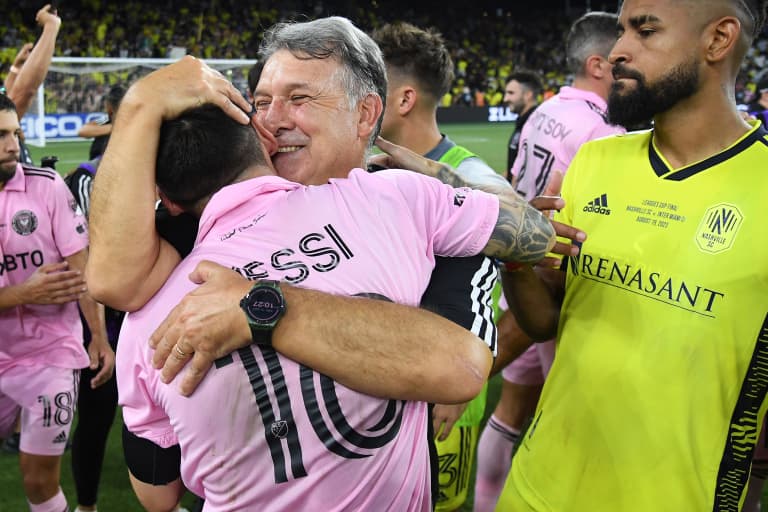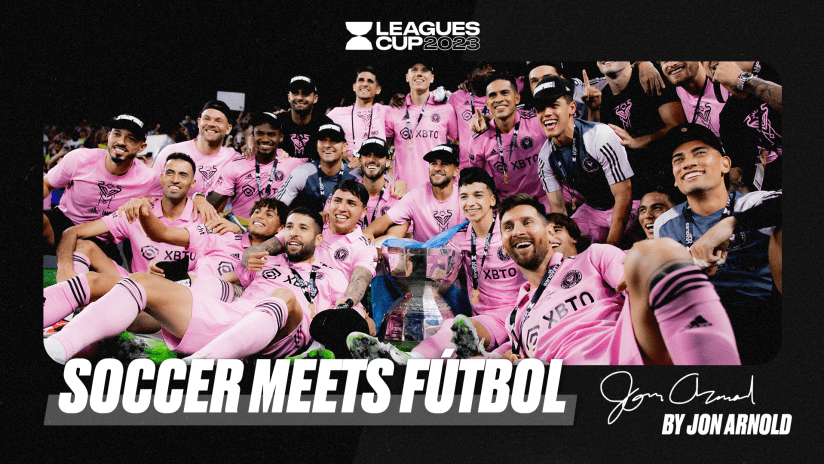NASHVILLE — Tata Martino couldn’t help it. Even someone who has been in the sport as long as he has, enjoying so many triumphs, let some negative thoughts enter his mind ahead of the penalty shootout that defined the Leagues Cup final.
While respected globally, the manager is still trying to overcome a reputation for falling short in critical games. Prior to Argentina’s World Cup breakthrough in 2022 and the Copa América title the year before that, Martino had guided Argentina to the final of the 2015 Copa América and 2016 Copa América Centenario. Both times, however, Chile stymied Lionel Messi, Martino and the rest of the national team.
As things wrapped up in regulation of Saturday’s final, Martino admitted he began to wonder if another trophy was slipping from his grasp.
“When we won, I felt a lot of joy. When Leo Campana missed a goal as time expired and we went to penalties, the two finals against Chile in Copa América crossed my mind, in 2015 and 2016,” Martino said after the final. “Luckily, I was wrong.”
He was. Goalkeeper Drake Callender scored a penalty in the 11th round of the shootout, then made a save in the same round to give Inter Miami CF the win, 10-9 in the shootout after a 1-1 draw with Nashville SC in regulation.
Those who didn’t watch Leagues Cup closely may draw the conclusion that Inter Miami’s journey to the championship was easy. Those who lived the dramatic moments of the penalty shootouts here and in the first knockout match against FC Dallas will assure those casual spectators that wasn’t the case. Martino’s anxiety shows just how even the match was and how close Miami came to falling short.
“We had to suffer because we played a final, and in a final you suffer,” the manager said. “We played against a very good team as visitors.
“I also don’t lose sight of the fact that Leo (Messi)’s shot off the post could’ve given us the win and the last play from the other Leo (Campana) could’ve given us the win, but today we played a game that, for me, was very even over 90 minutes and very even in the penalty shootout too.”
At least the first shootout ended in five kicks. Saturday’s final stretching 11 rounds meant the goalkeepers paid to stop the shots had to try to score them, too. Miami shot-stopper Callender converted his kick, and then extended to deny counterpart Elliot Panicco.
“Once I realized I was going to have to take one, it was pretty exciting. I’ve never taken a PK like that before. It was my first professional goal,” Callender said. “I had two saves in a shootout. I hadn’t made a save in a shootout before as a pro, so it feels good to work hard and be prepared for these moments.”
The 25-year-old backstopped Inter Miami confidently throughout the tournament and earned praise from Martino and his teammates, But the Cal product being called upon in such a critical moment is an example of how Inter Miami needed to come together even with the addition of Messi, Sergio Busquets and Jordi Alba at the dawn of Leagues Cup.
Martino noted there are still new arrivals in the squad who haven’t been in enough training sessions to understand the team’s ideology, something unlikely to change before Inter Miami’s next match, a U.S. Open Cup semifinal Wednesday against FC Cincinnati.
“The most important thing we had to do is put a team together while we were fighting to win a seven-game tournament. That’s really difficult to do, to try to compete, compete well and win and meanwhile assemble a team because we practically haven’t trained,” Martino said. “That’s the challenge we had in front of ourselves, needing to compete without the chance to have a lot of training sessions.”

Still, there are few complaints about how things have gelled and gelled quickly, with the best player in the world a fantastic component to have in the quest to put together a tournament-winning team.
Young players like Callender, Benjamin Cremaschi, David Ruiz and Diego Gomez also proved to be important pieces despite a lack of name-recognition with international soccer fans. Even some veterans, it seems, are feeling the Messi effect and finding their footing more easily, helping propel Miami to this first-ever title.
“You’ve got to tip your hat to the quality of their group,” Nashville manager Gary Smith said. “Guys that were not playing to the sort of level we now see them at have just blossomed and are producing soccer at a level we hadn’t seen from them before. Whatever the reasons are, this team has come together very quickly, and they’re enormously difficult to play against.”
Smith’s opposite number feels the same about facing Nashville, with Martino aware the game could’ve gone differently and the trophy could’ve been lifted by the hometown Boys in Gold.
For now, those negative thoughts for the Argentine have lifted. Things are good, very good, for Inter Miami. The future looks positive. They've secured a place in the 2024 Concacaf Champions Cup and will fight for more silverware. The first one, though, is on its way to the trophy case. It wasn’t easy, but Inter Miami is the 2023 Leagues Cup champion.

















